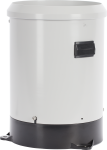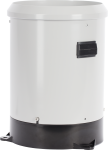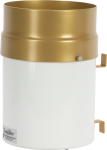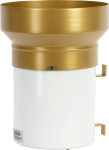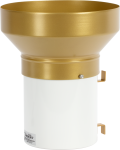
Ideal for high-intensity precipitation






Overview
The CS700, manufactured by HS Hyquest Solutions, is a high-end tipping bucket rain gage with an 8 in. orifice and a heavy-duty cast aluminum base. It measures precipitation in 0.01 in. increments. The CS700 is ideal for locations where intense rainfall events may occur. This tipping bucket is compatible with all Campbell Scientific data loggers and is used in environmental monitoring applications.
Read MoreBenefits and Features
- More accurate measurement of high-intensity precipitation
- Extra-heavy metal construction for durability and long life
- High precision—tips at 0.01-in. increments
- Compatible with most Campbell Scientific data loggers
- Accuracy is ±3 percent at high precipitation rates of 500 mm/hr
The "-L" on a product model indicates that the cable length is specified at the time of order.
Images



Detailed Description
The CS700 funnels precipitation into a bucket mechanism that tips when filled to its calibrated level. Each tip is marked by a dual reed switch closure that is recorded by a data logger pulse count channel. After measurement, the water drains through two orifices (accepts 12 mm tubing) in the base, allowing the measured water to be collected in a separate container.
The CS700 contains an internal siphon mechanism that causes rain to flow at a steady rate to the tipping bucket mechanism (regardless of intensity). The siphon allows the sensor to make accurate measurements over a range of 0 to 50 cm per hour.
Specifications
| Sensor Type | Tipping bucket with siphon and dual reed switch |
| Measurement Uncertainty |
|
| Measurement Uncertainty | 700 mm/h (27.6 in./h) maximum rate per hour |
| Rainfall per Tip | 0.254 mm (0.01 in.) |
| Measurement Range | 0 to 700 mm/h (0 to 27.6 in./h) |
| Operating Temperature Range | 0° to 70°C |
| Humidity Range | 0 to 100% |
| Cable Type | Two-conductor shielded |
| Drain Tube Size | Both filters accept 12 mm (0.47 in.) ID tubing. |
| Orifice Diameter | 20 cm (7.9 in.) |
| Height | 34.2 cm (13.5 in.) |
| Weight | 3.3 kg (7.4 lb) with 7.62-m (25-ft) cable |
Compatibility
Note: The following shows notable compatibility information. It is not a comprehensive list of all compatible or incompatible products.
Data Loggers
| Product | Compatible | Note |
|---|---|---|
| CR1000 (retired) | ||
| CR1000X (retired) | ||
| CR300 (retired) | ||
| CR3000 (retired) | ||
| CR310 | ||
| CR350 | ||
| CR6 | ||
| CR800 (retired) | ||
| CR850 (retired) |
Additional Compatibility Information
Mounting
The base of the gage is supported by three legs. A CM240 Leveling Base and Mount or a user-supplied baseplate with leveling capability is recommended. The CM240 may be attached to a CM300-series mounting pole, or to a user-supplied 1.5 IPS (1.9-inch outer diameter, unthreaded) pipe (see Ordering Information). A concrete pad is recommended.
Wind Screen
Campbell Scientific offers the 260-953 Wind Screen to help minimize the affect of wind on the rain measurements. This wind screen consists of 32 leaves that hang freely and swing as the wind moves past them.
Data Logger Considerations
Each tip of the CS700 is marked by a dual reed switch closure that is recorded by a data logger pulse count channel.
Documents
Brochures
Frequently Asked Questions
Number of FAQs related to CS700-L: 15
Expand AllCollapse All
-
These rain gages don’t necessarily generate a voltage range, but rather a pulse. Depending on how the rain gage is connected to the data logger, the gage can generate a sourcing current or a sinking current pulse.
-
The CM240 fits the CS700-L, TB4-L, and the retired 385-L rain gages.
-
These rain gages can be connected to either.
- When a control port is used, one lead goes to the 5 V port to provide current, and the other lead goes to a control port to detect the current.
- When a pulse channel is used, one lead goes to the pulse port, and the other lead terminates on a ground terminal.
-
The following are some suggestions to try:
- Check that there is a solid connection to the reed switch. The screws should be tight, and the wires should have a solid connection to the screws.
- Try switching the connection from the current reed switch being used to the secondary reed switch connection.
- Check that the cable is connected to the correct input on the data logger. Take the two wires on the other end of the cable (the sensor side) and touch them together. The data logger should register a tip. If the tip registers, the issue is with the reed switch. Replace the reed switch.
- If the data logger still doesn't register a tip, try using a different cable.
-
Not registering any tips, missing tips, or double tips.
-
If data is not being logged correctly, there are two likely causes:
- The reed switch has failed.
- There is a faulty connection from the rain gage to the data logger, typically caused by a broken conductor or corroded wiring.
-
- Remove the housing assembly from the base by removing the three screws and lifting upward on the housing.
- Check the bubble level to verify the rain gage is level.
- Pour water through the inner funnel to wet the two bucket surfaces. Using a graduated cylinder, slowly pour 314 cc (19.16 in3) of water, over a 15 minute period, into the collection funnel. This volume of water is equal to 0.39 inches of rainfall (10 mm).
- After the water has passed through the rain gage, the tipping bucket should have tipped 39 times for the TB4-L or CS700-L, or 50 times for the TB4MM-L.
- If the rain gage fails to record the correct number of tips, return the unit to Campbell Scientific for recalibration.
-
The 260-953 Alter-type rain gage wind screen consists of 32 heavy metal leaves that hang freely and swing as the wind moves past them. The swinging leaves act as a wind damper and help minimize the effect of wind on the rain measurements without adding additional turbulence.
-
Not enough tips or too many tips.
-
When a rain gage is out of calibration, it is usually because of the buildup of dirt and grime on the internal surfaces of the tipping bucket mechanism. Cleaning the internal surfaces usually brings the rain gage back into calibration. It is also possible that a rain gage is out of calibration because it is no longer level.
To minimize the possible occurrence of calibration errors, perform routine cleaning and maintenance of the rain gage at least once every three months. The environmental conditions at a particular site may require a facility to perform cleaning, leveling, and maintenance on a much more frequent schedule.
Case Studies
The West Texas Mesonet (WTM) project was initiated by Texas Tech University in 1999 to......read more
In a country as large as Argentina, monitoring growing conditions in different agricultural regions is......read more
Associated Links
Privacy Policy Update
We've updated our privacy policy. Learn More
Cookie Consent
Update your cookie preferences. Update Cookie Preferences

